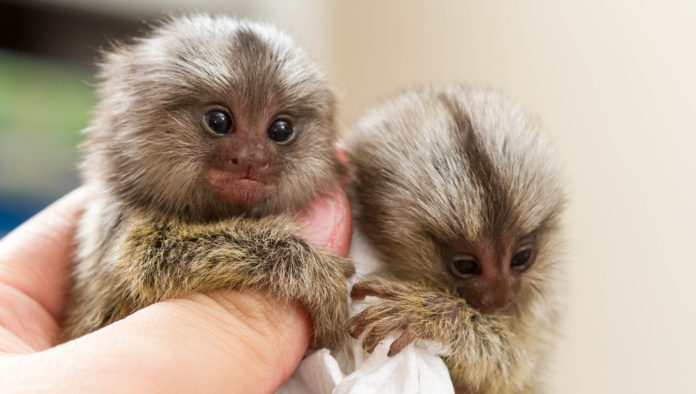Last Updated on February 6, 2024 by Fumipets
Exploring the Enchanting World of Finger Monkeys
Finger monkeys, scientifically known as pygmy marmosets, are captivating creatures that enchant observers with their miniature size and endearing features. Native to the rainforests of South America, these tiny primates belong to the family Callitrichidae and hold the title of the world’s smallest monkey species.
With their lively personalities and diminutive stature, finger monkeys have become increasingly popular as exotic pets, drawing attention for their remarkable characteristics and unique care requirements.
Finger Monkeys
As exotic pets, finger monkeys are becoming more popular. We do not advocate these pint-sized furballs as pets, despite their cuteness. Finger Monkeys are not suitable as pets since they are wild and have not yet been tamed.
Continue reading to discover more about Finger Monkeys and why we don’t suggest them as pets. This article describes why having one of these monkeys is controversial, as well as who these sensitive animals are best suited for. They’re only appropriate for professional groups, so be warned.
What Is a Finger Monkey?
Finger Monkeys are actual monkeys, despite their little and charming size. In fact, they are the tiniest monkey species on the planet. They are also one of the tiniest primates on the planet. Thumb Monkeys, Little Lions, and Pocket Monkeys are other names for these monkeys.
The pygmy marmoset is the scientific term for Finger Monkeys, despite its many aliases. Marmosets, such as the Finger Monkey, reside in the South American rainforest’s trees. The Finger Monkey is the tiniest of all the Marmosets, measuring about 4. 6 to 6. 2 inches in length (without the tail).

Their Life in The Wild
Finger Monkeys enjoy very sociable lifestyles in the wild. They live in tiny groups consisting of one male, one female, and their progeny. The size of Finger Monkey groups may vary between 2 and 10 monkeys. Finger Monkeys are typically monogamists, however there is occasionally an extra male to assist care for infants.
Female Finger Monkeys normally give birth twice a year and virtually always give birth to twins. Sometimes, one or three monkeys may be born, although it is less usual. Unlike many other animals, the males provide sole care for the infant throughout its first two weeks of life.
In all, Finger Monkeys live to be between 12 and 16 years in the wild, but their life expectancy increases to between 15 and 22 years in captivity. That being said, most study suggests that just 25 percent of Finger Monkey newborns make it to full adulthood.
Price
Finger Monkies typically cost between $4,500 and $7,000. Some factors impact the price such as the species, age, and temperament.
The Controversy Over Keeping Finger Monkeys
Let’s speak about owning Finger Monkeys and the controversy that surrounds it now.
Reasons People Like Finger Monkeys
Finger Monkey ownership is rising, as you could guess, due to their tiny size and cuteness. Let’s be honest: these monkeys are utterly enticing to look at. Who wouldn’t want a little bundle of joy on their finger?
Another advantage of Finger Monkeys’ modest size is that they are less expensive to care for. Finger Monkeys are one of the most economical monkeys to purchase as pets when compared to bigger monkeys and primates. They still cost thousands of dollars to buy, but their food budgets are far smaller.

The Downsides of Finger Monkey Ownership
To put it another way, Finger Monkeys are not tamed. As a consequence, they have a harder time adjusting to life in captivity than dogs, cats, and certain birds. Finger Monkeys in captivity may get melancholy, bored, or even nervous. This is particularly concerning since Finger Monkeys are naturally violent. Male Finger Monkeys, even in the wild, are very aggressive and prone to throwing their excrement.
Even though a Finger Monkey cannot murder you like a gorilla, in captivity, Finger Monkeys may get quite furious and destructive. They have the potential to wreck your home, scratch you, or cause injury to other people in the house.
Furthermore, in order for the animals to be happy, you must purchase at least two Finger Monkeys. Unfortunately, most individuals do not have the financial wherewithal to purchase two monkeys, so they only purchase one. This just serves to increase the monkey’s boredom, sadness, and rage. Two monkeys are in double danger at the same time.
The final disadvantage of owning a Finger Monkey is that they are vulnerable to a variety of human illnesses. Finger Monkeys, unlike dogs, may get a cold, chicken pox, or even HIV. As a consequence, they might be challenging to look after in terms of health care.
Do Finger Monkeys Make Good Pets?
In light of this debate, the issue remains: do Finger Monkeys make excellent pets? No! Finger monkeys are not suitable as pets. Even though these monkeys are charming, the challenges and downsides of having them surpass their cuteness.
We believe that owning a Finger Monkey is immoral since domesticated lives often result in monkey maltreatment, even if the harm is unintentional. Similarly, keeping Finger Monkeys as pets may be exceedingly challenging for the owner, resulting in a ruined house and different injuries.
Finger Monkeys, as a result, make awful pets. Don’t purchase one for yourself, even if they are adorable. Simply go to the zoo, watch Animal Planet, or hunt out hilarious videos online to get your Finger Monkey fix.
Who Are Finger Monkeys Right For?
Finger monkeys are not suitable as pets. They are wild animals that need unique living circumstances and concerns. Regular pet owners lack the knowledge, space, money, and skills required to cater for the needs of Finger Monkeys.
Finger Monkeys, on the other hand, are appropriate for experts. They may, for example, be a terrific addition to a legal and respected zoo since they are so adorable to look at while yet having all of the supplies they need. Finger Monkeys, once again, are only suited for specialists who understand how to properly care for these vulnerable animals.

How to Care for a Finger Monkey
It’s vital to recreate a Finger Monkey’s natural environment in order to care for it. This involves providing a very vast habitat with plenty of opportunities for climbing and swinging. At least two Finger Monkeys, if not more, must be housed in the cage. The huge cage should be placed outdoors in direct sunshine for optimal results.
In addition to fruits, vegetables, and insects, finger monkeys need a well-balanced diet. Because they must be fed every two hours, Baby Finger Monkeys need an unique diet. If your Finger Monkey becomes ill, see an exotic veterinarian who specializes in primates and Finger Monkeys.
Conclusion
We cannot emphasize enough how disastrous it is to introduce a Finger Monkey into your house, both for you and the monkeys. Finger monkeys are natural creatures that should not be kept in captivity. Instead, they need a full-sized cage that includes other Finger Monkey buddies and resembles their native environment.
As a consequence, typical pet owners should avoid Finger Monkeys. Even if primate ownership is permitted in your area, they are not suitable for typical pet owners and should not be acquired by zoos or other professional groups.
Questions and Answers About Finger Monkeys
What is the size of a finger monkey?
Finger monkeys are incredibly small, with an average size ranging from 4.6 to 6.2 inches (12 to 16 centimeters) excluding their tail. Their diminutive stature makes them one of the tiniest primate species, earning them the nickname “finger monkeys” due to their ability to wrap around a human finger.
What is their natural habitat?
Originating from the lush rainforests of South America, finger monkeys are primarily found in countries like Brazil, Colombia, Ecuador, and Peru. They thrive in the canopy layers of tropical forests, showcasing remarkable agility in navigating through branches and foliage.
What do finger monkeys eat?
Finger monkeys are omnivores, and their diet consists of a varied menu. In the wild, they feed on tree sap, gum, insects, fruits, and small vertebrates. In captivity, a balanced diet for a pet finger monkey includes fruits, vegetables, insects, and specially formulated primate pellets to meet their nutritional needs.
Can finger monkeys be kept as pets?
While finger monkeys may seem adorable and appealing as pets, it’s essential to note that they have specific care requirements. In many places, keeping them as pets may be subject to legal restrictions due to conservation concerns and the need for specialized care. Always research and ensure compliance with local regulations before considering a finger monkey as a pet.
What kind of social structure do finger monkeys have?
Finger monkeys exhibit a unique social structure characterized by cooperative breeding. They live in family groups led by an alpha female and male, with other members assisting in caring for the offspring. This cooperative behavior fosters a close-knit community within the group.


















